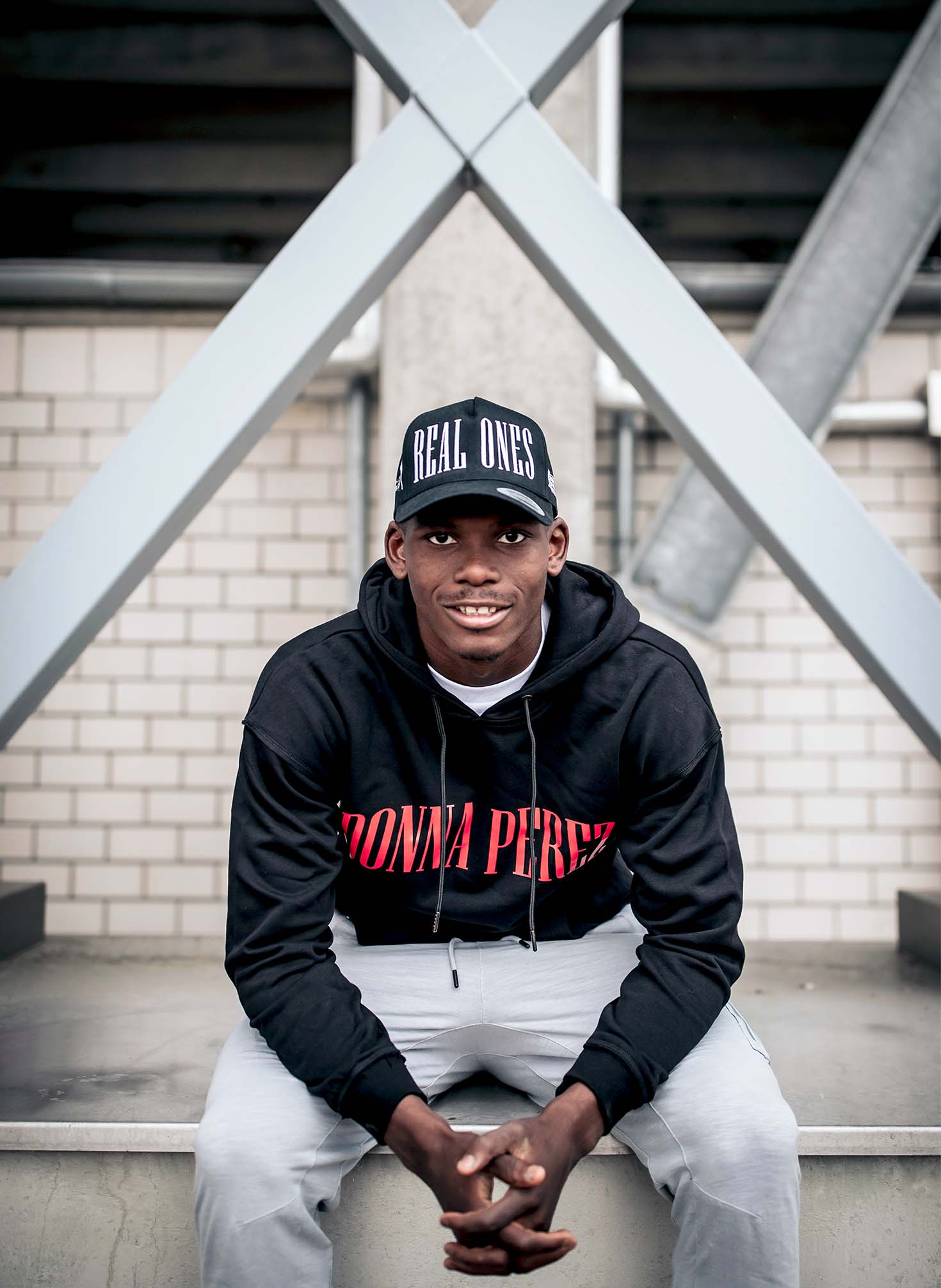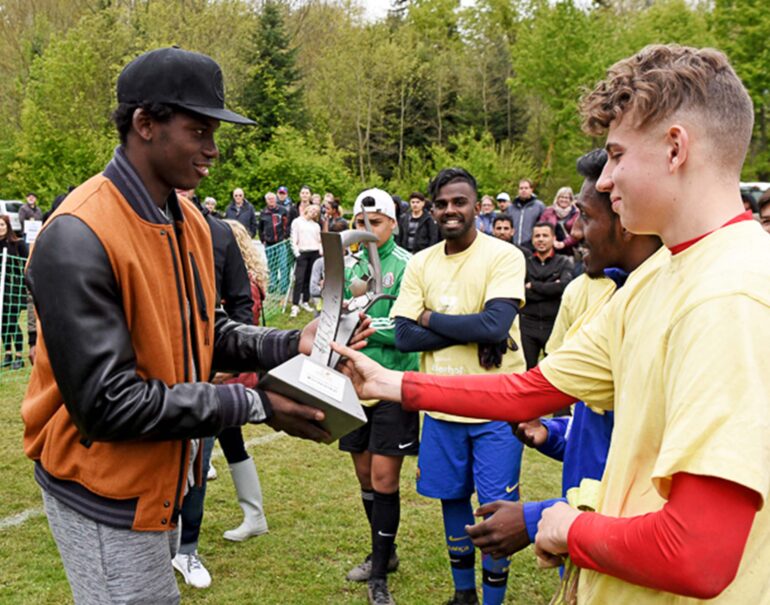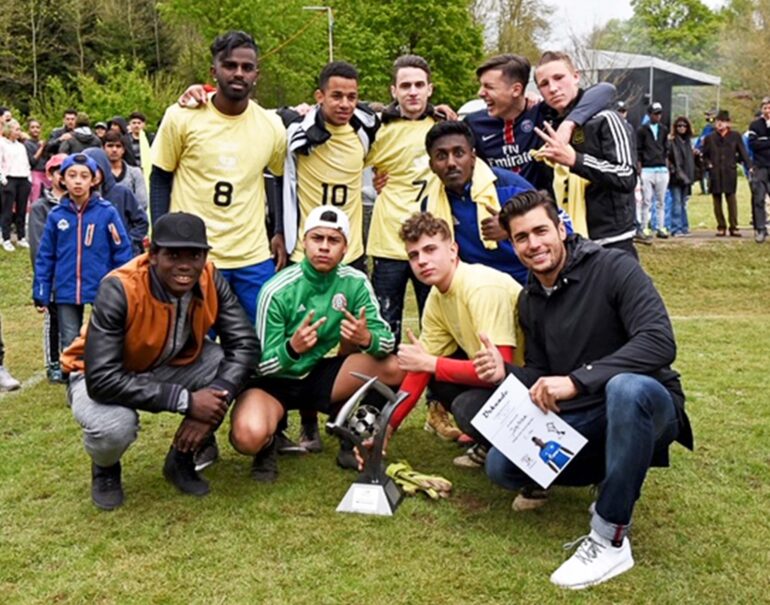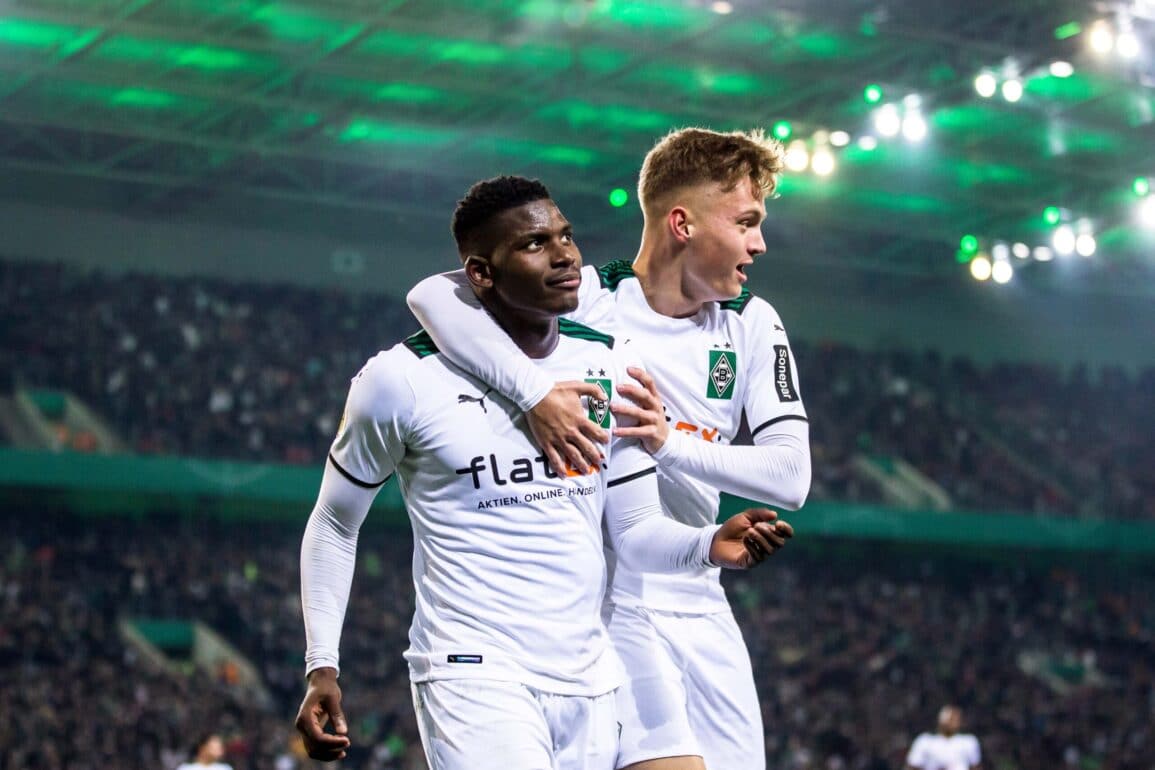When the Embolo Foundation was established, Breel Embolo was just starting his football career at the age of 17. Thanks to its well-coordinated team, the foundation is now able to react quickly and offer targeted aid.
You established your own foundation in 2015. What made you take this step?
In 2015, I was still completing my apprenticeship at the Football Association. Jeannette Paolucci was my teacher. She came up with the idea of establishing a foundation.
Why establish your own foundation? You could have just made a donation if you wanted to do good.
Back then, my family was already sponsoring a child, and Jeannette Paolucci was involved in non-profit work in Peru. After a spontaneous discussion, we realised that we had a common interest in the field of non-profit work. This led to the idea that we could use my name to make more of an impact. Although I have to say, I was a little sceptical at the beginning. After all, I was only 17. Establishing a foundation in my name was a challenge for me at that age. I asked myself: what will this change for me?
You were right at the start of your football career and were still playing for FC Basel.
I was still very young. I also wasn’t on the national team yet. I actually wasn’t even a regular player for FC Basel yet and I didn’t have the reputation and image that I have today.
Didn’t it take a lot of courage to establish a foundation in your name?
It did take a lot of courage. It raised expectations in the public eye. I couldn’t assess the situation in the same way that Jeannette Paolucci did. I couldn’t have done it by myself. But she believed in me. She realised how many people we could reach using my name, what we could achieve and how we could help children with it. Today, I have to say that establishing the foundation was a great idea. In the first few years, my eyes were opened as to how much of an impact we could make. It’s amazing to be able to provide people with easy-to-access aid. Everything has run smoothly so far. But there are always things that can be done better.
Where does the foundation operate?
We run projects in Cameroon – where I’m from – and in Peru, where Jeannette Paolucci has already worked. She is on the Board of Trustees. And we also operate in Switzerland.
Reading about the foundation’s work, one gets the impression that your focus is on getting things done.
That’s right. We wanted to create something informal, something different. We want to make sure that everyone who donates knows that every centime helps – no matter if someone donates five centimes or CHF 5,000, it all helps. We don’t have piles of money. That’s why we fight for every centime, and are delighted every time someone makes a donation. We also want to show where every centime goes.
Have you visited the projects yourself?
I’ve visited projects in Switzerland and Cameroon, or I attended events there. Unfortunately I haven’t visited Peru yet. I always spend a few days of my holidays doing something charitable. That’s when I visit the projects myself. It’s always a great experience seeing where the aid goes and how people are helping themselves.
What do you take away from these experiences?
They give me strength, and I can switch off. It’s really something different. And that is exactly how it should be. That was our main goal. We have all donated to a project. But when you are directly involved in the project, can visit it and experience what has been achieved and implemented, and how we were able to help – it’s very moving. It spurs us on to provide even more help. I’ve seen what people need. And we all feel the tremendous gratitude. People are very happy about the projects. To see that the aid works, and to recognise that it is urgently needed by its recipients – these are the two things that we targeted when establishing our foundation.

«We want to show where every penny goes.»
Breel Embolo
You’re building a football pitch in Peru, for example. How do these kinds of projects come into existence?
It differs a lot. We’ve got a very good link to the football association, and we get lots of requests through our contacts. We’ve also built a school together with a partner, and jointly organised the resources for this. For the projects we support, it’s important to us to give people prospects. This is why we are committed to education, health and healthy eating. This project was very successful. Generally speaking, we always have different projects on the go, including smaller ones. We also provide aid at short notice, too, as we are doing now for Ukraine.
What did you do?
We organised aid supplies and drove to the border – Jeannette Paolucci also went. On the way back, we took refugees.
To react quickly, you need a team that functions well together.
We definitely do. We are a team, a family. Due to my work as a professional footballer for Borussia Mönchengladbach, I’m not able to be at every meeting. But I’m always kept up to date about everything, I know what’s going on. This is how we’re always able to react in a flexible way.
Such as reacting to the war in Ukraine?
A year ago, no one would have thought that there would be war on European soil again. We just got together and discussed what we could do. This included simple questions, such as how much the fuel would cost for a return trip. We considered whether we had the budget for the project. When we decide to carry out a project, things start moving pretty quickly. We have a team that is extremely flexible and hardworking. They put their heart and souls into their work, and believe in what we do. They never pursue their own interests. It is important to us all that these projects are not carried out for image reasons. Everyone helps out of their own conviction. Experiencing this always gives me goosebumps. We work like a family.


The integration tournament was the first project in Switzerland. In 2017, the second edition took place in Reinach BL.
The foundation also provided rapid aid after the catastrophic floods in the Ahr valley in Germany last year. Your projects are characterised by the fact that you can draw on a wide network, especially from football. In your opinion, does sharing common ground shape charitable work?
Yes. In these kinds of situations, everyone can see what is happening and put themselves in the shoes of those affected. The internet and social media make it easy to contact people and get mobilised.
What did the campaign involve?
The best thing about it was that the Ahr valley campaign was connected to football. We were told about a campaign called ‘Fussball hilft Fussball’, which was run by a footballer from Ahrweiler, and decided to help out. On social media, Jeannette Paolucci asked people to donate items, and a lot of football clubs, companies and even anonymous donors took part. We were also able to react quickly and flexibly here. It helps that our foundation isn’t fixed on one project, and we can help at any time. We can discuss projects in the foundation, talk about any objections, and clarify if we have the means to help and how we can do so. We also think about if it would be better to invest our efforts in another project. And then we get to work – always looking forwards. Unfortunately, too much goes on in the world and we can’t always help with everything. We work informally, we stand together and prepare, so we can react to the next event.
Do you have any projects that are particularly close to your heart?
I always want to connect the foundation’s projects to football, which is why I am particularly proud of our refugee football tournament – our first project in Switzerland. We wanted to let refugees know that they are welcome, so we came up with the idea of an integration tournament. We wanted to create a special day for the refugees, during which all they had to do was enjoy playing football and have fun. It was very special to be able to be a part of the first tournament. Former teammates, football players and other celebrities also took part. The tournament showed the power of sport and how it unites everyone.
How much influence does your own story have?
Sport also really helped me to integrate when I moved to Switzerland from Cameroon. And that’s why the tournament was so special for me. We were able to give the refugees a day during which they could put their problems to one side. For ten, twelve hours, they could play football without any worries. But we are also very aware that their lives continue after this day.
When you started your football career at FC Nordstern in Basel, were you already aiming to become a professional football player?
I always say that being a footballer is a dream job because you get to experience how cultures and people who speak different languages come together and all get on with each other. When you experience the crowd in a stadium, it’s easy to understand why this sport plays a part in uniting people and bringing them together. The aim of the game is pretty simple: the ball has to go into the goal. Which is why, for me, the game is the easiest path to integration. When I started at FC Nordstern, I wasn’t the top talent who could easily get past ten opponents. Football was much more about integration for me. I played football at school, I had played football in Cameroon, and I played football in my district in Basel. I got to know people and experience emotions. Of course, we also argued. But by the next day, it was all forgotten.
How did you end up at FC Nordstern?
I went to FC Nordstern because most of my friends from my district played there. I never really thought about a professional career. Back then, football was the best part of my life. I could be who I wanted to be. I could play football with my colleagues. The best thing was getting out on the pitch together on Sundays, and if we won, it was the number one topic of conversation on Monday.
You managed to get Manuel Akanji, a teammate from the national team, to be an ambassador for the foundation. Was it difficult to convince him to do this?
No. It was great that he was instantly on board. Manuel is like a brother to me. We’re always in touch. We know everything about each other. He is also heavily involved in projects in Nigeria, which I will also help him out with. That’s why it was quite easy to get him involved. He knows everyone here – and he knows Jeannette Paolucci very well.
What projects do you want to do in the future?
In relation to the foundation, we want to change the concept slightly. We want to organise a variety of events, and be more outward-looking. We want to rejuvenate the team and make the work easier for them. My biggest goal is to make the lives of those who do so much for children easier. We have lots of supporters who are older, who put their heart and soul into their work. But they take a lot on, which is why we want to lighten their load and also appeal to younger helpers, and motivate them to get involved. My main aim is to get the foundation involved in more important projects. It would be a great honour for me, alongside playing football. We now have to unite the different ideas in the foundation. We’re on the right path. And hopefully I’ll be able to fulfil my greatest dream one day.
What is your greatest dream?
I want to establish a football academy where we could take on kids and give them a future through sports and education. Then, when I’m 35 or 40, I could work with the children and share my experiences. That’s my greatest dream.


